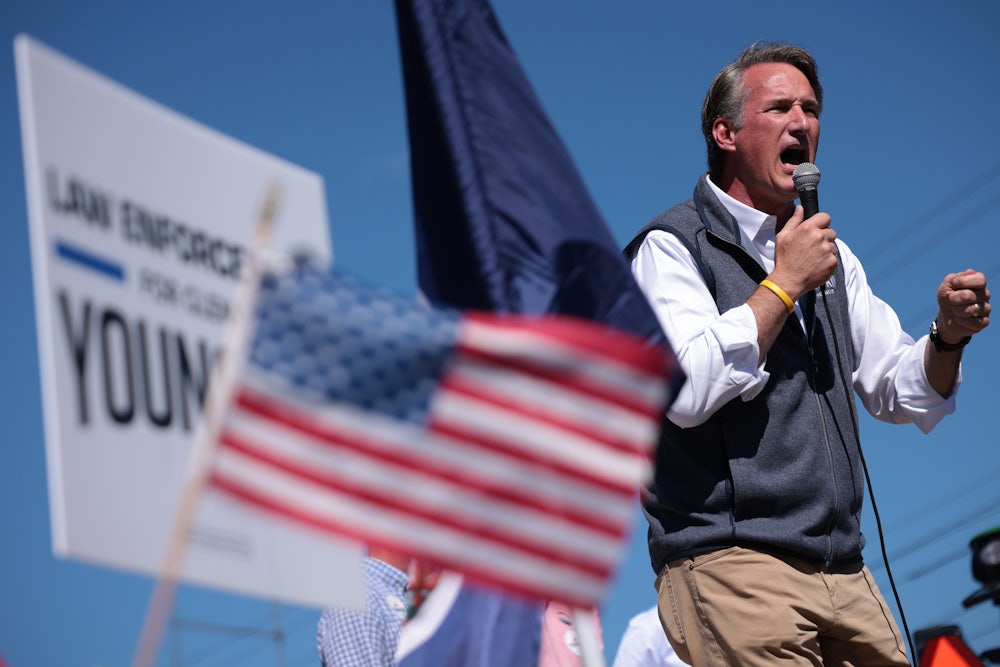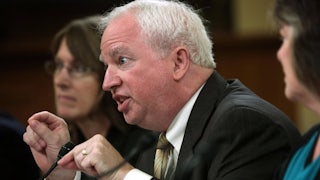At first glance, Glenn Youngkin looks like the sort of Republican that has been going extinct in the Trump era. The GOP nominee for Virginia governor is a private equity veteran worth $300 million, having spent 25 years at the D.C.-based firm the Carlyle Group, where he finished his career as co-CEO. Socially and fiscally conservative, Youngkin has run as pro-gun and anti-union. In another era, he would be your standard outsider businessman candidate, a filthy rich guy who wants to show the people of Virginia how a sharp businessman can teach wasteful government a thing or two.
But upon closer inspection, Youngkin instead looks like the kind of Republican we might see more of in the coming years, especially in the politically purplish swaths of the country. Last week, he first refused to answer a question about whether he would have certified Joe Biden’s 2020 victory, had he been in Congress. He has since walked it back, but that’s consistent with his strategy for months: to present himself as a superficially conventional corporate lackey, as suburban Republicans prefer, yet be armed to the teeth for the culture wars and an apparent Big Lie believer, to appeal to the Trumpist base. And it just might work in Virginia.
On Friday, the Cook Political Report moved the gubernatorial race to a “toss-up.” FiveThirtyEight has Democrat Terry McAuliffe, who previously served as governor from 2014 to 2018, leading by a mere three points. Both campaigns have been insisting the race is closer than it appears for months, which should be taken with a grain of salt (donors are more likely to write checks for tight races), but the evidence suggests the November 2 election will come down to the wire. The result may foreshadow next year’s midterm elections, and will also suggest whether Republicans can appeal to the suburban voters they’ve lost in droves amid the party’s Trumpist turn.
Virginia wasn’t supposed to be this competitive anymore. Its transformation from red to blue happened so quickly that it spent practically no time as a swing state. Between 1952 and 2004, the state’s electoral votes went to a Democrat exactly once: in 1964, when Lyndon Johnson won in one of the biggest landslides in presidential history. Since 2008, Virginia has voted for a Democrat in presidential elections every year. A Republican has not won a statewide election since Bob McDonnell defeated Creigh Deeds for governor in 2009. Two years ago, The New York Times explained how Virginia had gone from “deep red” to “solid blue,” as the state’s farmland increasingly gave way to suburbs. In 2016, it was the only former Confederate state to back Hillary Clinton; last November, Biden won it by more than 10 points.
Granted, McAuliffe isn’t the most electrifying candidate. Though popular during his last stint in Richmond, he’s the dictionary definition of a “Democratic insider”: a close friend of the Clintons who served as chairman of the DNC in the early 2000s. And Youngkin appears to have a lot going for him. Virginia’s off-off-year elections have, until recently, benefited whichever party currently does not occupy the White House. Republicans, furious at an election they falsely believe was stolen, are engaged. Democrats might not be. Meanwhile, McAuliffe’s close ties to the Biden administration were a key part of his initial appeal, but with Biden’s approval rating tanking, that’s become a liability on the campaign trail. “That’s the difference in this race from now and two months ago,” former Republican Congressman Tom Davis told Slate. “When Terry announced, the first thing he did was come out with Joe Biden. I don’t think he’s going to be doing that again.”
Youngkin was neither the most nor least Trumpist candidate in the Republican primary. The Virginia GOP’s convoluted process for choosing a candidate was nearly overrun by hard-core Trump supporters, who hijacked the nominating convention. (Virginia’s Republican primary was settled via a convention, which some MAGA-aligned candidates felt was meant to rig the process against them.) One such candidate, Amanda Chase, referred to those who stormed the Capitol on January 6 as “patriots.” But Youngkin kept some distance from Trump, instead running as a Christian conservative while exploiting the kinds of red-meat culture-war stories that pass for policy in Republican circles these days. His “day one” agenda includes an array of tax cuts, as well as banning Covid lockdowns and “critical race theory.”
At Tuesday’s final gubernatorial debate, Youngkin continued to woo Trump voters with dog whistles. He insisted as governor that schools would teach “real history,” a reference to critical race theory. He opposed the state’s vaccine mandate and dodged a question about whether being vaccinated for measles, rubella, and the mumps should also be voluntary, saying, “Data associated with those vaccines is something that we should absolutely understand the difference between this [Covid] vaccine.” And he said he would support Donald Trump if he won the party’s nomination in 2024.
Youngkin’s strategy seems straightforward: Avoid the most bombastic corners of Trump world—particularly the claim that the 2020 election was stolen—while playing footsie with it. Youngkin refused, for instance, to say during the gubernatorial primary whether Biden was a legitimate president and has promised an “election security task force” that would essentially purge voter rolls. At the same time, he ran a campaign attempting to meld older GOP orthodoxy (tax cuts) and its newer varieties (he once uploaded four separate videos criticizing “critical race theory” on the same day). The play is cynical and transparent: Do just enough to convince the MAGA faithful that he is one of them without losing too much suburban support.
But Trump and many of his supporters are all-or-nothing types. Trump himself has questioned Youngkin’s loyalty to the king. “The only guys that win are the guys that embrace the MAGA movement,” he said during a recent radio interview. “When they try to go down a railroad track, you know, ‘Hey, oh yeah, sure, love it, love it. Oh, yeah, love Trump. Love Trump. OK, let’s go, next subject.’ When they do that, nobody, they don’t—they never win. They never win. They have to embrace it.” Youngkin has responded with more winking and nodding toward Trump’s base, like his waffling last week about whether he would have voted to certify the 2020 election. His hope, clearly, is that various Republican and independent factions will hear what they want to hear and ignore the rest.
In this sense, Youngkin represents a test for the political press. He is not a rabid Trumper, but he is willing to exploit unfounded claims of fraud in the 2020 election and has promised sweeping voter suppression efforts if elected. He may look like an older breed of Republican, but he’s making no secret about what his true priorities are. That he’s doing this in a statewide race, in what is charitably a purple state, says a great deal about the state of the Republican Party. When you become a cult of an authoritarian racist whose power remains undiminished by a reelection defeat, you get candidates like Glenn Youngkin.
This article has been updated.






